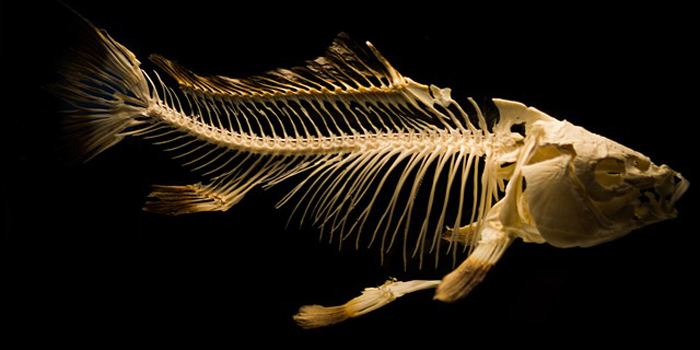
Tim Elmore is one of my favorite writers. He has done more form coaches, teachers, parents, and employers on how to deal with the next generation than just about anyone. He labels them as generation iY and has figured out how to speak the language of the new millennials. I particularly enjoyed this one.
The biggest problem among strength coaches is instead of developing critical thinking skills we have developed criticism skills @TimElmore
— Mark Watts (@Elitefts_EduDir) April 8, 2015
Why Leaders Learn to Eat the Fish and Spit Out the Bones
Part of becoming educated is to learn from people, books, podcasts and other sources you don’t completely agree with—while being able to “eat the fish and spit out the bones.” You know what I mean, don’t you?
For me, it means reading after authors who have expertise and perspective on issues that lie far outside my strengths or opinions. It means I may glean from an agnostic even though I am a person of faith. It often means I learn from people of different backgrounds, ethnicities, lifestyles and ages. And I always try to assume they offer me something I can learn.
Far too many people I meet have a “me against you” mentality and just cannot listen to anyone if they sense that even one portion of their message doesn’t align (If we don’t totally agree, you can’t help me at all). This is sad because it limits what a person can learn, it narrows their horizons, it diminishes their ability to grow, and it eventually separates them from people who could really help them.
Criticism without Critical Thinking
Every year, I speak to thousands of college students, and this past year, I was saddened by a few pitiful reactions by some of them. They wrote scathing comments to me or my organization about something they completely misunderstood (but were cocky enough to assume they did). Instead of assuming a posture of humility and asking questions to clarify, they blasted away. Honestly, I was embarrassed for them. Far too many students just don’t understand how to have civil conversations, both online and in person, and I think it stems from poor emotional intelligence. (Note: I am not speaking about comments that logically oppose mine. I take those happily and always welcome a civil debate.)
What’s more, it seems that many students have become unable to glean from anything that feels “hard” or “insulting.” Students are far too easily offended these days, often feeling insulted when they haven’t been. Where did they get this? Why aren’t they open to others’ ideas? And why are they unable to get past their own emotions?
Five Steps to Equip Students to Eat the Fish and Spit Out the Bones:
As the leaders of today’s students, I believe it’s our job to help them learn how to eat the fish and spit out the bones. This ability to dispassionately learn from others is an important step towards emotional maturity, and I think there are a few steps we must take to help students do this.
1. We need to toughen them up and thicken their skin.
Hara Estroff-Marano said it in her book—we’re raising a nation of wimps. In our effort to remain politically correct, it’s now almost impossible to say anything even remotely harsh because it appears like animosity. This is a sad, unintended consequence of a well-intentioned goal. We must toughen kids up, and the best way to do this is to have honest conversations about real issues. If you see students being offended unnecessarily, call it out and talk it out. This will help them understand that disagreement can lead to the greatest growth… if we can handle it.
2. We must equip them with critical thinking skills… not criticism skills.
We must help students learn to read—I mean really read—content. Critical thinking doesn’t imply we have a judgmental attitude — it implies the ability to use logic to evaluate and measure the value of an idea. Too many students are experts at criticism, but miserable at critical thinking. If they’re going to criticize, they’d better improve their critical thinking. This means developing their intellectual and emotional muscles, pushing past the fog created by their emotional bias or protective instinct. Again, the best way to help them develop these skills is through honest conversations.
3. We must model understanding and empathy for those who’re different.
If students are going to learn to “eat the fish and spit out the bones,” we must show them what it looks like. In other words, adults must embody the ability to learn from those who are different; to capitalize on, perhaps, one strength someone else has and let it enhance our journey. I call it the 101% Principle: Find the 1% you can glean from, and give it 100% of your attention.
4. We must broaden their horizons to learn from opposing views.
This is huge. Students are obviously still maturing, and part of that journey requires us to enable them to learn the art of consuming and discarding: digesting what is helpful, and eliminating what is not. Only mature people can do this. When we mature, we need not write scathing letters charged with emotion. We can be grateful even for an enemy, who helped us grow where we’re not yet strong.
5. We need to enable them to mature emotionally.
Finally, learning this art is usually an issue of managing our emotions. When our emotional needs outweigh our logical abilities, we say and do stupid things. Emotional intelligence begins with self-awareness and self-management. When we do this well, it empowers us to glean from anyone. One test of our maturity is this: what is it I feel the need to criticize? Is it an extremely important issue, or is it not? If it’s not—we are still in need of maturing.
Abraham Lincoln was opposed and criticized as much as any U.S. president. Men attacked him in his own cabinet. Several times, he would write scathing letters in reply to the attacks, but he learned the important habit of placing those letters in the top drawer of his desk. The next day, he would pull them out and read them again, often realizing they didn’t need to be sent. He had vented, but his own criticism was more emotional than logical (or the issue just wasn’t worth debating). After he died, several of these letters were found in the desk drawer unsent. What a wise leader.
What are some other ways we can help students learn to eat the fish and spit out the bones?
Read the original article here
Source: http://growingleaders.com/
 Dr. Tim Elmore is a leading authority on how to understand the next generation and prepare tomorrow’s leaders today. He is a best-selling author, international speaker, and president of Growing Leaders, a nonprofit that helps develop emerging leaders under the philosophy that each child is born with leadership qualities.
Dr. Tim Elmore is a leading authority on how to understand the next generation and prepare tomorrow’s leaders today. He is a best-selling author, international speaker, and president of Growing Leaders, a nonprofit that helps develop emerging leaders under the philosophy that each child is born with leadership qualities.
Tim and his team provide public schools, universities, civic organizations, and corporations with resources that foster the growth of young leaders who can transform society. For over 30 years, he has taught leadership through the power of images and stories that enables young adults to influence others in a positive way. Tim is dedicated to helping:
- Create students who take initiative to improve their school’s culture.
- Enable teachers and parents to understand why today’s teens act the way they do.
- Correct crippling parenting styles and disengaging teaching styles.
- Gain the attention of a younger generation so that they listen.
- Equip students to think and act like authentic leaders.
- Guide unprepared adolescents toward productive adulthood.
Tim believes that “every kid can be a leader, because leadership is about influence.” He trains high school and college students with skills to serve at school, work, home, and the community. Since founding Growing Leaders, he has spoken to more than 350,000 students and staff on hundreds of campuses across the country, including Stanford University, Duke University, Purdue, Auburn University, University of North Carolina, Georgia Tech, and Baylor University. Tim has also taught courses on leadership and mentoring at nine universities and graduate schools across the U.S. and provided leadership training and resources for the National FFA Organization and major athletic programs, including the University of Alabama, Auburn University, University of Texas, Virginia Tech and the San Francisco Giants.









It's good for me to be reminded of it as well. I have learned things from coaches and lifters that I really can't stand personally, which I use on a daily basis. They may be a total jackass of a person, but I was still able to learn from them.